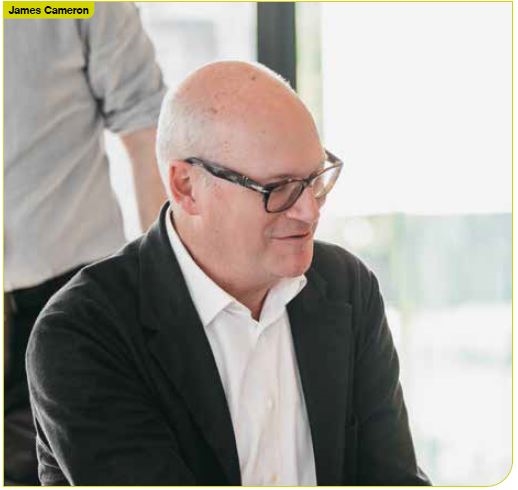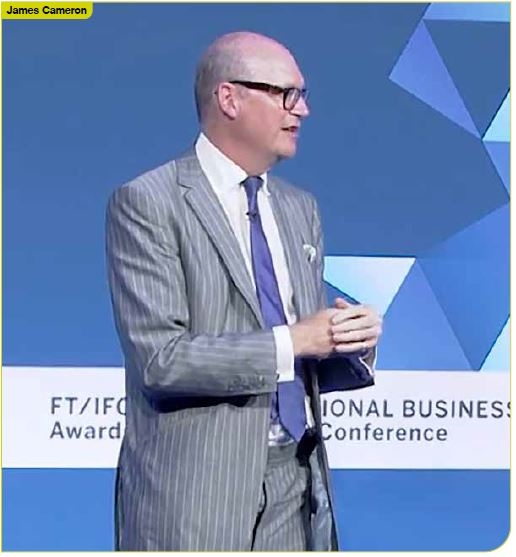IJGlobal ESG Lifetime Achievement Award – James Cameron
There are few names in the ESG community that trigger instant recognition more than James Cameron’s and the IJGlobal independent panel of judges was unanimous in its view that he should be the first winner of the ESG Lifetime Achievement Award.
The judges describe James as “a genuinely deserving recipient of a lifetime achievement award”, saying he displays “breadth, depth and brilliance – what more could one ask?”. They even singled him out for his involvement in COP26 where he “continues to lead from the front”.

The judges’ comments were rounded off with: “James was the founder of Climate Change Capital back at the beginning of this century when the environment was taken far less seriously. Through his work, he has helped to raise awareness of climate change globally and the importance of mitigating and adapting to it.”
James’ career is hugely impressive and a cursory read of his biography confirms the impact he has had, more than justifying his inclusion in the IJGlobal Hall of Fame which is being launched to identify winners of individual awards like this one. It also (lucky James) secures him a position as a judge on next year’s panel for the ESG awards.
He is internationally recognised for understanding the systemic nature of the difficulties faced in the infrastructure and energy space, and has the expertise to identify and mobilise effective levers of change in civil society, government and business.
And he has enjoyed a good run of it in his career, having qualified as a barrister and been called to the Bar in 1987, practicing from 3 Verulam Buildings, Gray’s Inn, London. He was counsel to Baker & McKenzie where he founded and headed its global climate change and clean energy practice. Further, he co-founded the Foundation for International Environmental Law and Development (FIELD) and the Centre for International Environmental Law (CIEL).
That’s just in the legal sector.
James is best known to the international infrastructure and energy community for having been the driving force behind Climate Change Capital (CCC) which he co-founded in 2003. Together with a powerful team, he developed CCC into an investment bank employing 150 people with $1.6 billion under management. He stayed on as chair until 2015.
James is a senior adviser to Pollination Global, SYSTEMIQ, Tulchan, AVAIO Capital and Carbon Cap. He is the chair of Global Sustainable Capital Management (GSCM), energy tech start-up Verv, and former chair (2012-20) of the Overseas Development Institute (ODI) where he remains on the board of trustees.
He is on the advisory council at Neste (Finland) and Heathrow 2.0 (on the future of aviation), the advisory board of Sun New Energy Holdings (India) and was a London Sustainable Development Commissioner.
James is non-exec director of Octopus Renewables Infrastructure Trust (ORIT), a newly-listed investment trust that recently raised a £350 million IPO; a NED for Crown Agents, which works globally with leaders to accelerate self-sufficiency and prosperity; and is a director of Ignite Power, Africa’s fastest growing solar company.
We could go on, but that effectively nails James’ credentials and – beyond a shadow of doubt – makes him a worthy winner of the inaugural IJGlobal Lifetime Achievement award… possibly setting an outrageously high bar for those who follow.
James Cameron interview
When you ask James to talk about ESG, there’s no stopping him… and to do so would be a travesty as there are few people on the planet as well versed to speak on the subject as he.
“I do think this is probably the most promising area of our economic development for rapid transition, despite the fact these are big systems that take a long time to replace,” says James.

“Whether it’s work like I did years ago with Solar Century in renewables or on the Infrastructure UK council in Treasury, and now at the Octopus Renewables Infrastructure Trust – with the Climate Change Capital story and the carbon disclosure project in the middle of that – getting data into the market to help investors and corporates figure out how on earth they will make the change to cope with climate change is key.
“All of those experiences tell me that both infrastructure and data can lie dormant in infrastructure investments, but when you put them together, they give you a powerful incentive to shift.
“I also advise an infrastructure fund in New York – AVAIO Capital – which does digital infrastructure as well as energy. We want all our new digital infrastructure to be run by renewable power. That is the way we want things to go.
“Just as we are having a green hydrogen debate, we should be having a green digital infrastructure debate, but there is a long way to go before that happens. However, it is perfectly possible to have renewable power plus storage on board for digital infrastructure – which is a nice virtuous circle because the better our digital infrastructure, the better able we are to produce the data which means that in due course we can manage supply and demand better in real time.
“There is a nice synergy there that has been under-emphasised.”
In anticipation of COP26
With COP26 – which James will be attending in Glasgow – kicking off this weekend, he had a message for the market.
“I have a role as an adviser to COP26 and I will do my best to help, but some of the big issues are not going to be easy to resolve in the remaining time,” says James. “So, I think we need to get our expectations in the right place.”
James continues: “One of the things I do think positively about is – there will be a lot of initiatives launched with a genuine desire to deliver, but perhaps not quite with the resources in place. I am a lawyer by training, so I would like to see contractual obligations… a real commitment to deliver an outcome and be accountable for it.
“There won’t be a lot of that. There will be a lot more commitments that are either political rhetorical, business intention or changing the narrative for investors… all of which is fine.
“I would suggest that from the point of view of infrastructure, there are three things that stand out in my mind and the first of those is the one we have just touched upon – that innovation is underway and has exponential power behind it.

“I think it is pretty much inevitable that that transformation is on the cards. The faster we go – and the bolder we are – the lower the costs and the higher the macroeconomic returns will be to the economy to modernise their infrastructure.”
James’ first point is primarily that innovation is happening now and that it is building impetus to the point where infrastructure will be re-designed around that innovation.
James continues: “We have to imagine all infrastructure coping with the physical consequences of climate change. Whether you are designing projects to deliver clean energy as opposed to dirty, or building traditional infrastructure – roads, ports, bridges, or whatever – it all has to be designed in a way to cope with these changes.
“And finally, we have to start imagining infrastructure in tune with the natural systems upon which we depend – and that comes in two components.
“We need to value nature in our economy, in principle and in practice. For example, we have this new UK Infrastructure Bank being formed and I am trying to persuade it to have natural capital as a mandate, to understand how to deploy capital in furtherance of the enhancement of natural capital.
“That has good rapport in Treasury and it is sound, but it can’t stay as a philosophical idea… it needs to be translated into investment practice and I would like to see that public institution become expert at delivering natural capital for the benefit of the nation, in conjunction with private capital being deployed.
“That institution – UKIB – and all other developments bank types that fund infrastructure have to be sure that the function that they provide enables us as a society to cope with the physical consequences of climate change and the societal consequence of building the wrong kind of infrastructure.
“Just staying with the existing system is going to be increasingly expensive for us as society, we have to have infrastructure designed as if the future mattered. And, of course, infrastructure investment is decadal in dimension.
“If we build the capacity to value nature and have a concept of natural capital we can translate to investment decisions – both in public institutions and private – we are much more likely to increase our resilience to climate change over the next two decades.
“We will have less societal cost associated with flooding and the likes, and we will build an infrastructure system that is capable of absorbing the innovations that are underway.
“We won’t have blocking infrastructure, sunk costs, stranded assets, big bits of kit that we no longer need – we will have a more robust, resilient, diverse infrastructure that is clean and efficient.
“That’s a great challenge, but I feel we are up to it.”
James gave an example of the convergence of renewable energy generation, energy storage, digital demand-side management and electric vehicles, those technologies are converging and becoming mutually supportive.
“When you have that, you know your transition is going to move faster,” says James. “There is going to be a time relatively soon where the incumbency will not be able to compete with electrons made that way, stored that way and distributed that way… and supported by electric vehicle infrastructure.
“That will become a virtuous circle that will be very difficult for the incumbents to compete with on cost. I cannot imagine any fossil fuel generation ever competing again with that system – not even gas.”
To read about all the winners in the latest issue of the IJGlobal Magazine, click here...
Request a Demo
Interested in IJGlobal? Request a demo to discuss a trial with a member of our team. Talk to the team to explore the value of our asset and transaction databases, our market-leading news, league tables and much more.

